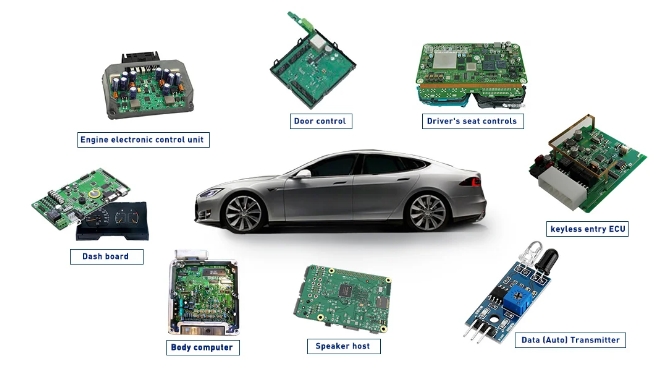Circuit card assemblies (CCAs) are essential components in modern automobiles, playing a crucial role in controlling and monitoring various systems. The automotive industry demands CCAs that are reliable, durable, and capable of withstanding the harsh conditions encountered on the road. This article explores the unique challenges and advancements in circuit card assembly for automotive applications.

Automotive CCAs must meet stringent requirements, including:
Environmental Durability: Withstanding extreme temperatures, vibration, shock, and moisture.
Electrical Reliability: Ensuring uninterrupted operation and minimizing potential failures.
Compact Size and Weight: Due to space limitations in vehicles.
Cost-Effectiveness: Meeting performance requirements while optimizing production costs.
To meet these demands, automotive CCA manufacturers employ advanced technologies:
Materials: High-performance materials, such as advanced FR4 laminates and flexible printed circuit boards (FPCBs), provide superior electrical and mechanical properties.
Manufacturing Processes: Automated assembly techniques, including surface mount technology (SMT) and selective soldering, ensure consistent quality and high-volume production.
Testing and Inspection: Rigorous testing protocols and advanced inspection methods verify performance and detect potential defects.
Quality assurance is paramount in automotive CCA manufacturing. Industry standards and certifications, such as ISO/TS 16949 and IPC-A-610, are strictly followed to ensure the highest levels of reliability and quality.
Automotive CCAs are used in a wide range of applications, including:
Engine Control: Managing fuel injection, ignition, and emissions systems.
Transmission Control: Optimizing gear shifting and torque distribution.
Safety Systems: Controlling airbags, anti-lock brakes, and stability control.
Infotainment Systems: Providing navigation, entertainment, and communication features.
The future of automotive circuit card assembly is driven by advancements in:
Autonomous Driving: CCAs will play a critical role in enabling autonomous driving features, such as lane departure warning and adaptive cruise control.
Electric Vehicles: CCAs will support the development of electric vehicles by managing battery systems and power electronics.
Connected Cars: CCAs will facilitate connectivity and data exchange between vehicles and the surrounding environment.
Circuit card assembly for the automotive industry requires a deep understanding of the demanding requirements and the application of advanced technologies and rigorous quality control. By adhering to industry standards and employing cutting-edge techniques, manufacturers ensure the reliability, durability, and cost-effectiveness of CCAs that drive innovation and performance in modern automobiles. Continuous advancements in materials, manufacturing processes, and testing methods will continue to support the development of sophisticated automotive technologies, enabling safer, more efficient, and connected vehicles.